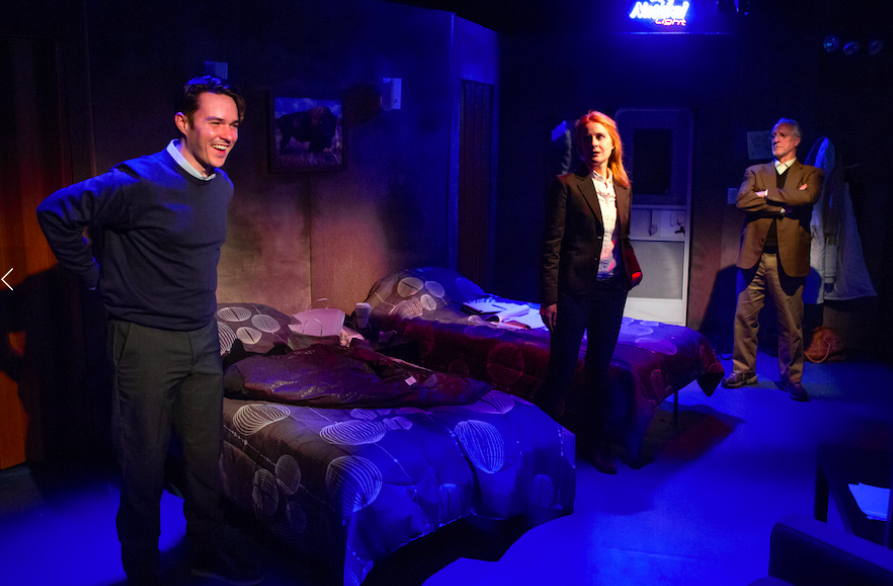Williston is a new American work from playwright Adam Seidel. Billed as a dark comedy, it examines oil drilling rights in a North Dakota town. Miranda Theater Company is presenting the work which opened on October 26th and runs through November 10th on the Lower East Side’s IATI Theater.
Tony nominee and MCC Artistic Director Robert LuPone stars in the three-person show and recently spoke to Manhattan Digest over the phone about the play, his career, and the unorthodox dream of working a 9-5 job.
MD: What attracted you to Williston?
RL: The play, the director, and the role. The role is what got me, but then the director really wanted me so how could I say no? (laughs)
MD: Did you have any background knowledge of the actual town before becoming involved?
RL: No awareness of it all. I didn’t know much about fracking except that it was environmentally not sound, but that was the extent.
MD: What type of research did you do?
RL: We watched many videos about what has happened there. That association informed me about the role.
MD: What did you learn through the process of the show?
RL: That your life just changes drastically. That town has changed from what it was before to what it is now. It’s really like a migrant camp. They have these huge campsites of dorm-like buildings. Workers come in, drill for oil and then leave. It’s a very transient and boom oriented society.
MD: You said that your life changed. Explain that a bit more.
RL: Well, it’s just how we deal with success and what that means to anybody. I’m thinking about the recent billionaire lottery winner. Life just completely changes to a point that they’re not even aware of, which is what I think happened in Williston. The local people there had a depressed economy in a town primarily composed of ranches. All of a sudden landowners gave way to oil companies and the money that they received transformed their lives. How they dealt with that and how that affected them is the really interesting aspect. How money changes the environment can either be luck or a tragedy.
MD: This is being billed as a dark comedy. How were you able to find the humor in that?
RL: That’s a good question (laughs). I would venture to say that I’m still trying to find the humor. My character is more like the heavy so he doesn’t laugh too much. There are certainly laugh lines but the subject matter of this successful salesman turning into a defeated salesman is really at the heart of this. with that, comes humanity and pathos.
MD: You’ve been involved in many aspects of the arts: director, dancer, television and stage actor. Is there one that you prefer over the rest?
RL: When I was in high school, they called me a renaissance man because I was in the plays, musicals, band, and academic groups. I was asked what I wanted to be when I grew up and I could never figure it out. So I just fell into each craft. I’ve been lucky enough to keep adding on to the resume. I’ve been able to stay in the business and be relevant. What do I like best? I like an audience that loves the show I’m producing, I like an audience that gives me support in the role I’m playing, I like an ensemble cast. I’m not terribly comfortable getting applause for myself. I like to find roles that scare me. It keeps the blood boiling. My role in Williston is one of them.

MD: Are there any existing roles you’d like to sink your teeth into?
RL: I’m an unrequited Elephant Man. I auditioned for it and was told by the casting director that I gave the best audition of the day, but I didn’t get the part. I was crushed. That is one role that I’ll never play. It’s a dream unfulfilled.
But, I had the occasion to go back into A Chorus Line after several years. I left that in 1976 and went back in 1989. It was remarkable having played a role and then revisiting it years later. You see how much you as an individual have changed internally from what you remember about the role. That was a fascinating experience. You’re not the same person.
RL: What would you be doing if you weren’t involved in the arts?
MD: I’ve never really had a job where you get a steady paycheck every two weeks. Only 6 or 8 weeks were spent doing civilian jobs-I was a chauffeur and a night watcher. When you get a steady paycheck, you can kind of plan your life. In the arts, it’s more hand to mouth. You never know when you’ll get your next job.
If I had the opportunity to live again, I would at least try a straight, corporate job. I’d sort of know what I was doing, even if it was boring. The fantasy of what I would do outside of that job is something that I’ve actually lived. So having lived it, I’m curious to see how the other half lives. The grass is always greener, right?
Miranda Theater Company presents Williston. Now playing through November 10th at IATI Theater. 64 East 4th Street NYC. For tickets and more information, visit Williston Play
